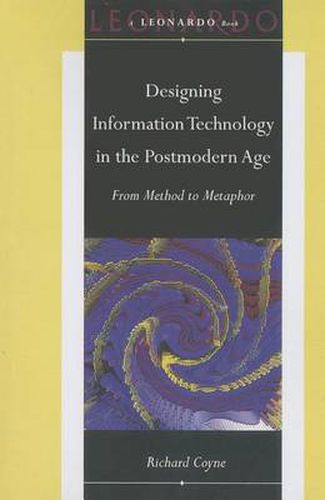Designing Information Technology in the Postmodern Age: From Method to Metaphor
Richard Coyne (Professor, Head of the School of Arts, Culture and Environment, The University of Edinburgh, University of Edinburgh)

Designing Information Technology in the Postmodern Age: From Method to Metaphor
Richard Coyne (Professor, Head of the School of Arts, Culture and Environment, The University of Edinburgh, University of Edinburgh)
Coyne examines the entire range of contemporary philosophical thinking-including logical positivism, analytic philosophy, pragmatism, phenomenology, critical theory, hermeneutics, and deconstruction-comparing them and showing how they differ in their consequences for design and development issues in electronic communications, computer representation, virtual reality, artificial intelligence, and multimedia.
Designing Information Technology in the Postmodern Age puts the theoretical discussion of computer systems and information technology on a new footing. Shifting the discourse from its usual rationalistic framework, Richard Coyne shows how the conception, development, and application of computer systems is challenged and enhanced by postmodern philosophical thought. He places particular emphasis on the theory of metaphor, showing how it has more to offer than notions of method and models appropriated from science.
Coyne examines the entire range of contemporary philosophical thinking-including logical positivism, analytic philosophy, pragmatism, phenomenology, critical theory, hermeneutics, and deconstruction-comparing them and showing how they differ in their consequences for design and development issues in electronic communications, computer representation, virtual reality, artificial intelligence, and multimedia. He also probes the claims made of information technology, including its presumptions of control, its so-called radicality, even its ability to make virtual worlds, and shows that many of these claims are poorly founded.
Among the writings Coyne visits are works by Heidegger, Adorno, Benjamin, Gadamer, Derrida, Habermas, Rorty, and Foucault. He relates their views to information technology designers and critics such as Herbert Simon, Alan Kay, Terry Winograd, Hubert Dreyfus, and Joseph Weizenbaum. In particular, Coyne draws extensively from the writing of Martin Heidegger, who has presented one of the most radical critiques of technology to date.
This item is not currently in-stock. It can be ordered online and is expected to ship in approx 4 weeks
Our stock data is updated periodically, and availability may change throughout the day for in-demand items. Please call the relevant shop for the most current stock information. Prices are subject to change without notice.
Sign in or become a Readings Member to add this title to a wishlist.


